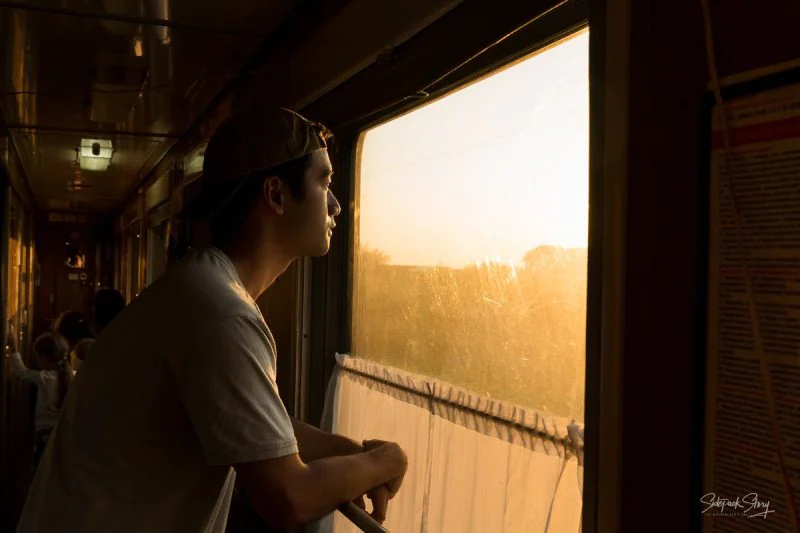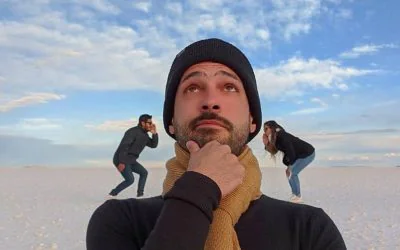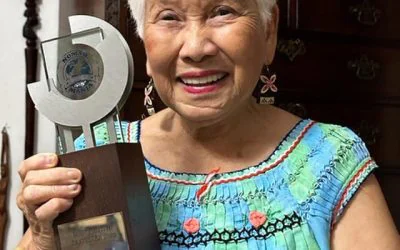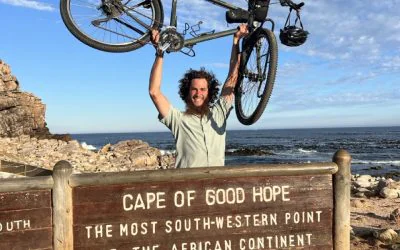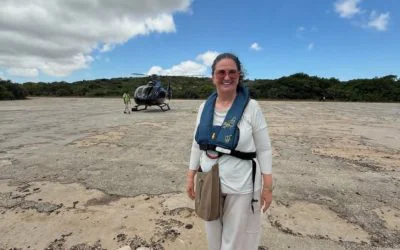We are very pleased to be hosting a traveller from Thailand today – not a country so famous for ‘exporting’ travellers. Petch has just completed an overland trip from his native country to Morocco and talks to us about this and other aspects of his travels…
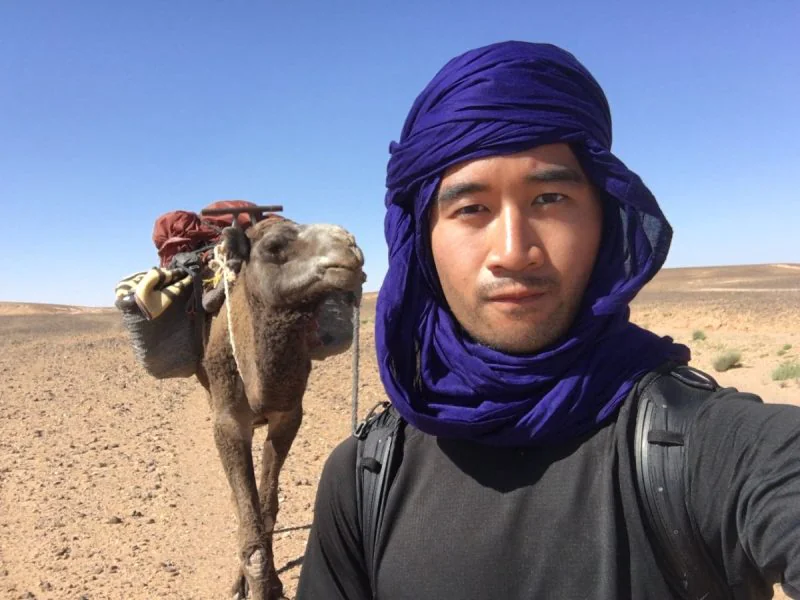
Trekking in the Sahara
Petch, tell us something about your early years and how your love of travel developed.
I grew up in Bangkok, Thailand and moved to the United States for schools when I was 16. My journey has started ever since. For 7 years, I hopped around Michigan, Oregon, California, and ended up graduating from the University of Washington, Seattle. Moving around frequently shaped me to be very comfortable being in new environments with people from different backgrounds.
My passion for travel was built up during college. I did several road trips with my friends in the American Midwest and nearby countries like Canada and Mexico. With an amazing diversity in North America, it urged me to want to see more and more. I started working several part-time jobs and put traveling as my priority because I knew it could have been the best investment at that time.
Towards the end of my college, I randomly booked a flight to Cuba and it changed my life forever. Of course, the country didn’t receive such a great reputation in the U.S. and there were many controversial opinions about traveling in Cuba. However, I found this place to be culturally unique and welcoming. The Cuban way of life is definitely worth the exploration, especially I have read 1984 many times before. The experience was nowhere near what I read in the book or heard from the media. It’s real and fascinating. Since then, I dedicated my life to traveling and explore the world firsthand.
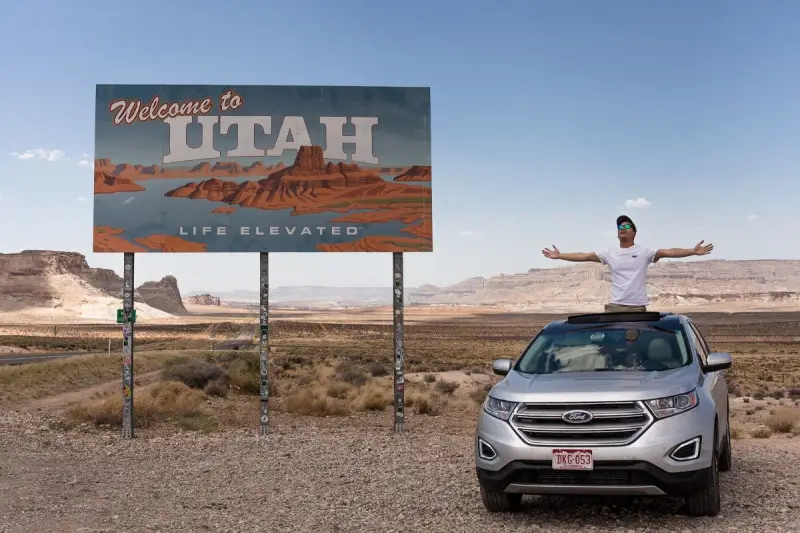
A road trip in Utah
You are a rare traveller from Thailand. While Thailand receives many incoming tourists, is it usual for Thais to be curious about the world beyond their borders? How have your family and friends taken your ‘traveler’ nature? And what reactions do you get when you tell people abroad you are Thai?
As technology is helping us to travel easier, backpacking culture and off-the-beaten-path travels are slowly growing among the Thais. It’s more possible now for us to set off with low budget plus Thailand is a hub for many airlines. Cheap flights are a good motivation to go beyond our border. There are actually many intrepid and famous Thai travelers but they may not be very well-known in a global community since, to capture Thai audience, they tend to create the contents in our local language.
Although most of my friends and family back home enjoy a completely different scope of travels, they are very supportive of my journeys. They get curious and excited about what I’ve got to show them in each destination.
While in remote places abroad, people often get surprised that I’m from Thailand because they have never met any of us. Some even say I’m their first Thai guest/person they’ve met. That always feels like an accomplishment. However, in more popular places, Thailand seems to be a very common destination to travel to. Most travelers have been to my country and seem to know it better than I do. Now that I’ve settled back home, I’m very motivated to explore more inside my border.
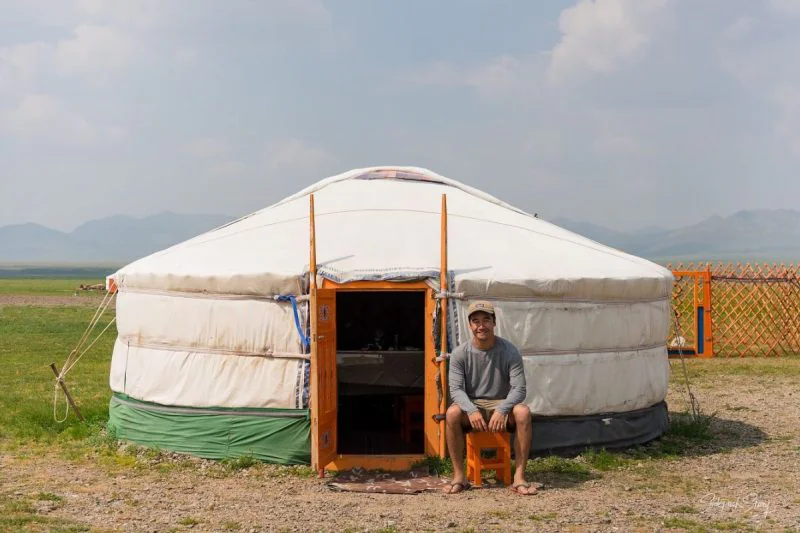
Experiencing nomadic life in Mongolia
You have just travelled alone by land from Thailand to Morocco. Tell us about this trip, your route, the preparation and what happened once you got going.
The mission began after my graduation in June 2018. I flew home to arrange all my visas and took off in August. I traveled 15,000+ km across 29 countries from Thailand to Morocco WITHOUT FLYING in 115 days. I took trains, buses, ferries, hitchhikes, etc. Pretty much any means of transportation that can get me closer to my final destination without taking a flight.
About my preparation, let’s break it down into 3 big parts:
Visas
According to passportindex.com, Thai passport has only 81 visa-free scores. It’s not one of the strongest but that never holds me back from traveling. Looking at the route in Asia, my passport covered all except China. In Europe, the Schengen visa easily covered 26 Schengen-zone countries plus roughly other 18 non-Schengen countries. Lastly, I only aimed to visit Morocco in Africa and I did need a visa for that. All in all, it only took me a month to acquire all 3 visas in hand.
Route planning
The route above was generated with Rome2rio. The software provided all the possible transportation to get from one place to another and the choices vary from planes, trains, buses, boats, to self-driving. Now, it’s a fun game of connecting the dots. Honestly speaking, I had no idea if the route would 100% work as planned but decided to bite the bullet and took off with it.
To give a quick overview of my journey, it started from a train in Bangkok to Laos, a bus to Vietnam, a train to Beijing, China to start off the Trans-Mongolian railways passing through Mongolia and finishing in Irkutsk, Russia. Then I spent 4 nights on the Trans-Siberian train straight to Moscow, crossed to Estonia, and took a bunch of buses around the Baltic states. More trains with my Eurail pass around Eastern Europe, down to the Balkans with more buses, then crossed from Greece to Italy by a ferry and made my way through western Europe, down to Spain. Finally, I took a ferry across the Strait of Gibraltar and arrived in Morocco. After that, it was a week-long adventure in the Sahara and 2 weeks of volunteering in the Berber village on the High Atlas.
Money
My daily budget went into 4 parts: transportation, accommodation, food, and other miscellaneous like laundry or tourist attraction fees. Other major one-time costs included visas, travel insurance, and a flight back home at the end of my expedition.
On average, I spent around 50 USD/day. I had a specific daily budget in different countries from my research, ranging from 20-50 USD a day, and that also determined how long I should stay. I wouldn’t stay long in an expensive country like Germany but rather spent more time in more affordable regions like Eastern Europe or The Balkans.
Of course, not everything went smooth as planned and I really enjoyed that. Apart from all the fun stuff, the big part of my trip was problem-solving and navigating myself through unfamiliar places. I only scheduled my trip up to Moscow and after that, it’s all week-to-week planning, depending on how I felt like or if I found anywhere on the map to be interesting and reachable.Overland travel can be redundant some times, especially when I had to go through 20+ European countries in a row. So, I try to have a small mission in each country such as staying with a Mongolian nomad family for a week, sleeping in a military prison in Latvia, visiting the smallest town in the world (with a population of 28 people) in Croatia, and many more.
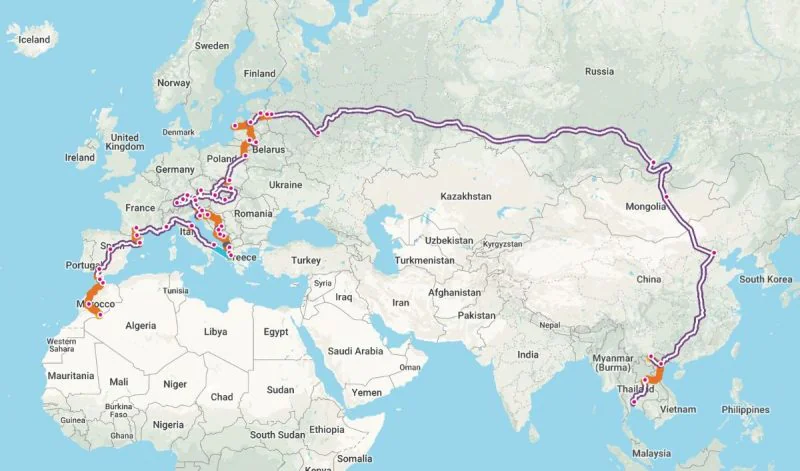
Overland route from Thailand to Morocco
Of the things you experienced, what most surprised you on this trip? Did you have any stereotypes that were either confirmed or completely disconfirmed?
The nomadic life in the Sahara desert most surprised me on this trip. I went on a 120-km trek for 6 days, starting from a small Moroccan oasis town called Mhamid, and met a desert nomad who lived in a ‘house’ made out of plastic bottles and paper boxes. It’s mind-blowing to see how he could make a living in such a harsh environment and emptiness. The weather was dry and the water source was limited. He regularly drank tea or water, baked delicious bread in the sand, and had a few goats for food. There’s no entertainment or social media. It’s all about life and surviving.
Soon before I made a judgment that all desert nomads were poor and had bad living conditions, I randomly met a ‘millionaire nomad’ in the middle of nowhere, with his big cruiser motorcycle. He owned about 150 camels which were worth around 600,000 USD or more in total. Apparently, camels must be very valuable assets to have in the desert since it can be used for labor, tourism, food, and more. This again just blew away any stereotypes I made about nomadic people. It made me realize how little I actually knew about this world. Nothing could really be confirmed as a stereotype. The planet is more diverse than we think and there’s always more and more to discover.
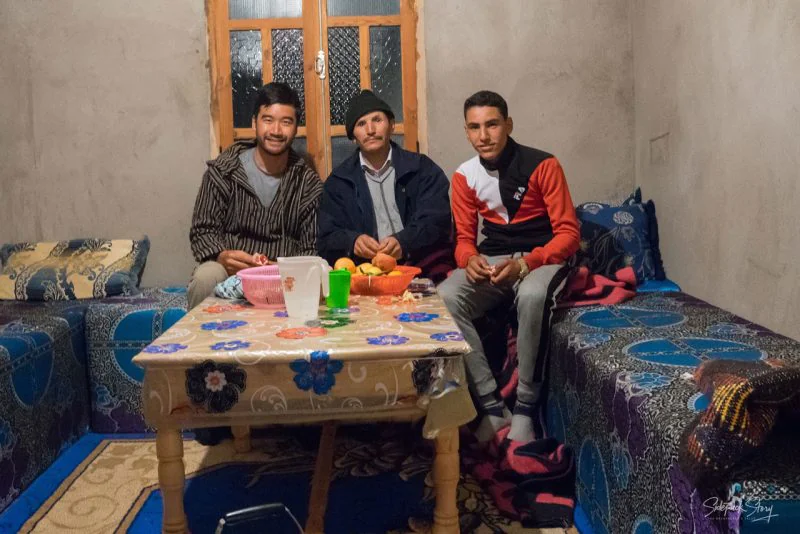
My berber host family in Ouaikmeden, Morocco
It seems this trip is only the beginning for you. What do you want to do next? Do you feel there is a choice you have to make between a ‘normal’ life and a traveler life?
Without a set timeline yet, my ultimate goal is definitely to visit every country in the world (now at 50 countries). There will definitely be more challenges along the way as I want to do more long overland trips either across Africa or South America and also an overseas journey on a cargo ship. As for this year, I aim to finish off 2019 with 55 countries, having Syria trip in November as a highlight.
I’m now back home in Bangkok and working for GiveBack GiveAway with the two co-founders Johnny Ward and Josh Henry. Our company runs trips around the world where we mesh adventure travels with the idea of giving back something meaningful to the places we visit. We work with local staff to build schools, clinics, and more for the communities on our trips.
I do feel lucky being able to integrate a ‘normal life’ with my ‘traveler life’. I couldn’t be happier with where I am today. I spend my days ‘changing the way people travel for good’ and making a positive impact on the grassroots communities around the world. Traveler in my definition doesn’t need to be on the road or flying somewhere new every day. It’s more about opening up our minds, learning more about others, and contributing our time to make the world a better place in some ways.
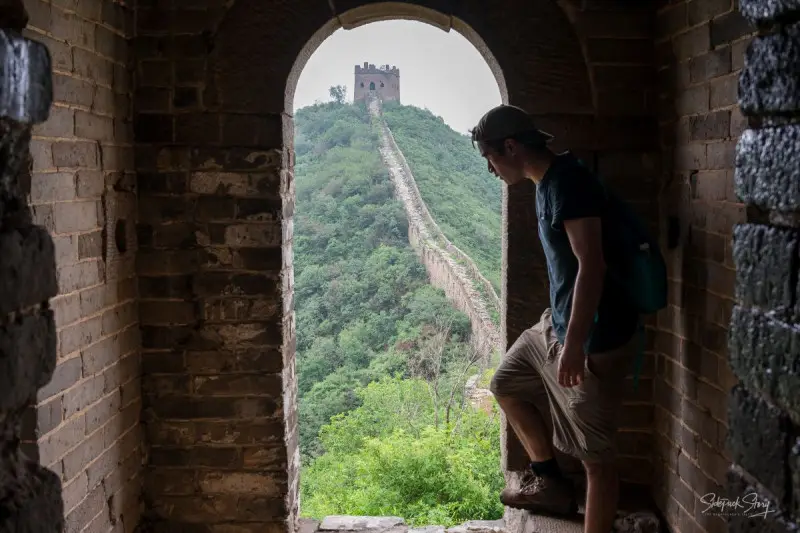
Hiking the Great Wall of China
You are just about to launch your own travel website, Sidepack story, and seem very active on social media. What are your aims by using these tools? What do you want to show people?
I always find travel stories to be helpful to others. People see the world in different perspectives, so my website is there to share my personal experiences and stories from amazingly unique people I meet along the way. I believe the world is such a diverse and beautiful place but unfortunately the media these days doesn’t do a very good job depicting what it’s actually like. I hope my messages to the readers will encourage them to put down any mental barriers, reimagine the impossibilities, and go out there to witness the beauty of our planet with their own eyes.
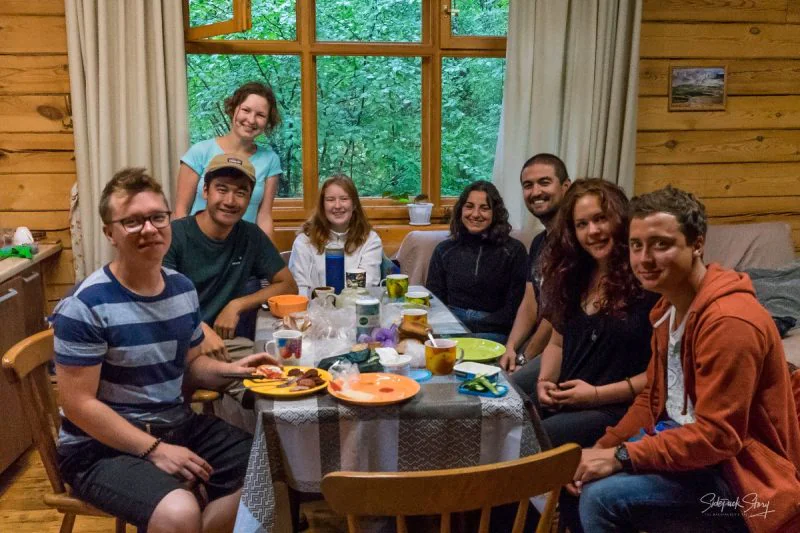
My hostel friends in Irkutsk
So, are you now ‘famous’ in Thailand?
I’m only known in a small travel community on my Instagram and my Thai Facebook page. Getting famous is just not my goal. I rather want my story itself to be heard because I strongly believe in the power of inspiration. It drives people with positive energy to go beyond the limits and continue inspiring more endlessly. Now, I’m working on creating my website and a Facebook page called “SidepackStory – Global” for all my foreign friends and English speaking audience.
Have you met many other from the travel community? If so, what do you feel links all these people, if anything? How are they different from ‘non-travellers’?
Yes, there are quite a lot of travelers based in Bangkok and also those stopping by. I’ve met many of them through travel meetups and friends. It feels like home when hanging out with these like-minded people. What links us all together is the passion for traveling and the curious mind about this world. There’s always a point where we found a connection between each other, whether having been to the same place or done the same thing. Though I believe everyone has a traveler soul deep down inside, I notice that frequent travelers tend to give more trust to other human beings. We have the opportunity to learn more about different lifestyles and cultural values. At the end of the day, nothing is right or wrong anymore. Humans are humans. We have seen enough to understand, accept, and simply befriend.
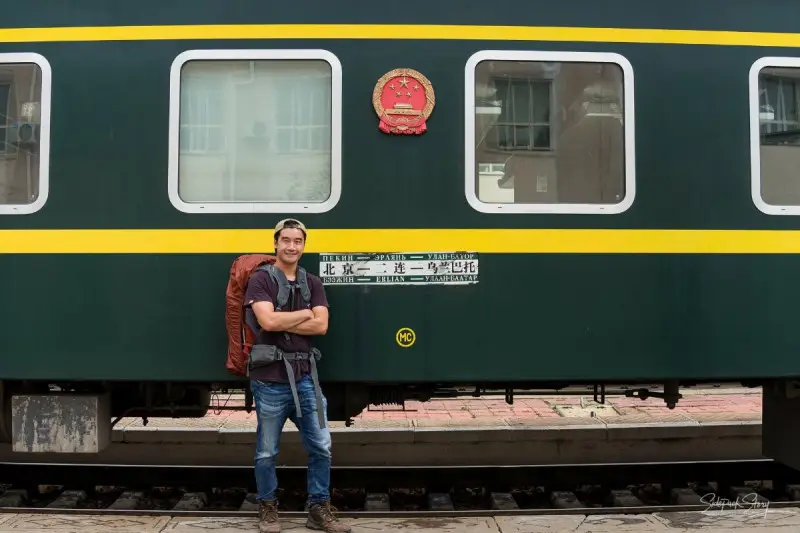
Trans-Mongolian train
Do you feel that anything about yourself has changed compared to before you had travelled?
I have become truer to myself. This is probably the most important lesson I’ve learned in my whole life. Nothing is better than being honest to your own identity and listen carefully to what your heart has to say. Without getting distracted by the social norms, I’m happier from within; I know what I want and make it happen without hesitation.
Finally, our signature question – if you could invite any 4 people from any period in human history to dinner, who would you invite and why?
Charles Darwin, Christopher Columbus, Yuri Gagarin, and Leonardo da Vinci.
I consider all four to be among the best ‘explorers’ of all times. Darwin was a scientist who explored the theory of evolution. Columbus was a navigator who explored lands by sailing across the Atlantic Ocean and controversially known to discover America. Gagarin was the first human to explore outer space. Da Vinci explored art, designs, architecture, science and many more, making him one of the best inventors ever.
Having 4 explorers from 4 different fields, it would be interesting to hear the conversation they get to have over the dinner table!
The photos in this interview are from Petch’s personal collection and we thank him for sharing his images with us here at NomadMania!
